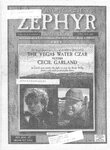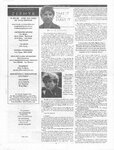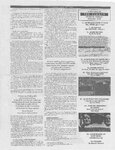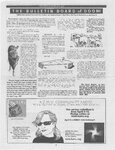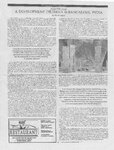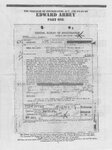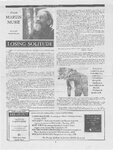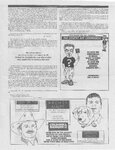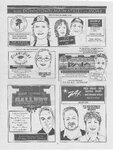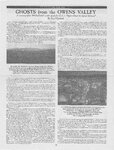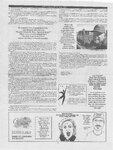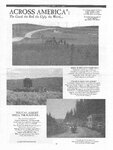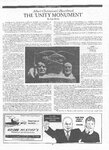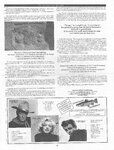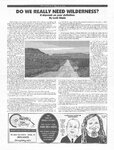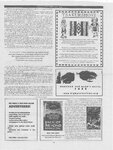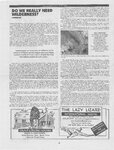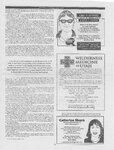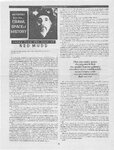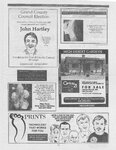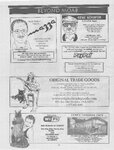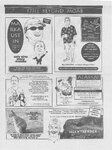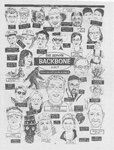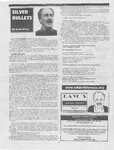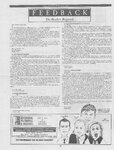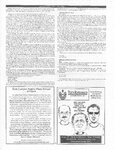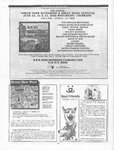| OCR Text |
THE ZEPHYR/ APRIL-MAY DO WE REALLY NEED _ WILDERNESS? 2008 “Wilderness” is a combination of two words, and means, exactly, “the wild deer place.” To the ancient Germanic tribes who gave us our language, the “wild deer place” was a vast and forbidding-unknown, a cipher, into which offenders of the social order were exiled, often never to be seen again. It wasn’t a place for inspiration and relaxation; it was that void which personified the primal fear of abandonment and alienation. Worst of all, somewhere in that awful place lived others...... people who did not obey the same laws, follow the same customs, or speak the same language......wild, dangerous, unpredictable humans. The English word “wild” stems from a proto-Indo-European word, “ghwelt”, from continued which is also derived the word “wool,” which means “unshorn,” with its attendant con- notation of something wild, unkempt.....- wooly. Boulder Mountain. It is a vast territory, twice the size of Connecticut, and one of the largest territories of all the bands of the Paiute Tribe. It was also one of the poorest, for it is a country of too little water and too little soil; too much slickrock, and too much sunlight. With the advent of Europeans, other Paiute bands adopted the tools and accouterments of white civilization- horses, felt hats, frock coats, and firearms. The Tuh’Duvaw, ae “Ghwelt” literally means untamed. The Latin word “ferus,” from which we derive our words “fierce,” “feral,” and “ferocious,” also stems from this same root, “ghwelt,” through its cognate, “ghwer.” Thus, a wilderness, according to the philology, is a savage, raw, lawless, inhospitable, and unwelcoming place. To the Tuh’Duvaw, the Kaiparowits was anything but this. It poor as they were, were both unable and unwilling to stray from their traditional folkways. It took more work, more resources, to maintain the white man’s ways of living. The country of the Tuh’Duvaw, the heart of which was the Kaiparowits, did not give up resources with ease or generosity. It was better, easier to cling to the old paths. s time passed, and the surrounding bands of Paiute became richer, and lost more and more of their territory, the Tuh’Duvaw became more isolated. In the Paiute world, it was always important to marry outside of the band. The yearly or semi-yearly get-togethers, or fandangos were vital to the arrangement of marriages between clans and between bands. On the shores of Fishlake, and in many other meeting places, the Paiute would Thus, a wilderness, according to the philology, is a savage, raw, lawless, inhospitable, and unwelcoming place. To the Tuh’Duvaw, the Kaiparowits was anything but this. It was safe, familiar, known ..they knew how to live comfortably, even stylishly, in its vastness. gather, to dance and feast on rockchuck, which was roasted in pits with spring beauty bulbs and biscuit root. While the young men and women eyed each other at the dances, the elders would talk of the past year and negotiate dowries. Unfortunately for wilderness, for wildness, for the prospects of liberty and the human soul, I don’t think Americans really want such a place, despite the irony that America used to be such a place. was safe, vastness. Why leave? For them, the Kaiparowits had become a I wondered what it might be like if somehow, the Tuh’Duvaw had hung on, hadn’t given in to the loneliness and the longing for their relatives. What if they were still here, still a wild, free people, and they weren't so pleased about me digging up the earth with my big machine? What if they guarded these remote hills and canyons jealously? What if it were actually dangerous to trespass on their land? It seemed to me that such a place would be really wild. their relatives in Kanosh or in Richfield, where they could find work and money, maybe a husband or a wife. Jack Turner, Aldo Leopold, Bill Plotkin, and countless others talk a lot about how es- By the 1920s, there was only a handful of Tuh’Duvaw left in their vast ancestral home- sential wilderness is for the preservation of the human soul. I don’t have a clue as to what a soul might be, but I think I know why it is intimately connected to wilderness. When a landscape is “protected” and “preserved” through legislation and legal language, and demarcations on a map backed up with surveys and scientific studies and permits and regulations and restrictions and user fees and rangers and guns and fines and <..... well what is wild about that? And when people from the city go there encased in neoprene and Gore-Tex™™ and nylon, carrying GPS units and satellite phones, what is wild about that? In a truly wild place, there are no laws, no permits, no rangers in green trucks with Kevlar armor and community college law-enforcement degrees to ask for permits and hand out tickets. In a truly wild place, all beings are equal under the sun. In a truly wild place, the people you encounter may be dangerous, but then, you have the right to be as dangerous as they are. In any case, relationships in the wild are based on mutual earned respect. In a truly wild place, your ability to choose your conduct is unconstrained by regulation. Out here, the great law is the law of natural consequences, and honor lies in accepting responsibility for your actions. If there are any limitations to your behavior, they exist within you alone. This, of course, is the essence of liberty. Liberty, the kind that land. These lived in a squalid camp on the outskirts of Escalante. They subsisted on the begging of flour, which they called pra’o, and by doing laundry and other odd jobs for a man named Tommy, (or perhaps Timmican, after the famous Paiute chief), had moved to Richfield. The last wild people had left behind the emptiest land in the entire continental United States. The robes of the Paiutes got me to thinking. The Kaiparowits plateau was their home, had trammeled it all over the place. Was it wilderness to them, I wondered? In other languages, words that can be translated into English as “wilderness” usually mean “uninhabited region”. The Greek word eremos means “lonesome,” “waste,” “desolation.” The Hebrew words that can be translated “wilderness,” almost all have a meaning of “uninhabited territory.” The Spanish word for wilderness, desierto, means “deserted,” “desolate,” “uninhabited.” Our English word can mean the same thing of course, and I suppose this was what Zahniser intended when he penned the definition found in the Wilderness Act: But I think that we accept this only at the expense of a deeper meaning of the word. THE LAZY LIZARD |—- i INTERNATIONAL HOSTEL One Mile South of Moab on US 191 : 435.259.6057 reservations@lazylizardhostel.com www.lazylizardhostel.com © et ; C3 2" a WE ALSO OFFE VM Check out our nightly rates: "THE BEST DEAL on the PLANET" 4 R desierto, arowits had, for the Tuh’Duvaw, gone from being their home, no wilderness at all, to a place of isolation and exile---as true of a wilderness, in the sense of the word as Zahniser uses it, as there ever was. The heartbreaking irony---it was civilization that created the wilderness, where one had never been before! to find mates at the fandangos. Maybe, after a while, the young Tuh’Duvaw left their home of sky and rock and empty space to find a different life, a more social life among and the Tuh’Duvaw did the Tuh’Duvaw an empty place, a place of exile. The civilizing energies of the whites, and their mental concepts of wealth and status had made the members of this small band so poor and so lonely they couldn’t live any longer away from the rest of their people. Thus, the Kaip- Soon, it became apparent that the Tuh’Duvaw were not able to display the horses, guns and European clothing that other Paiutes found to be valuable. The Tuh’Duvaw continued to wear their traditional garb of woven rabbit skin cloaks. Rabbits were caught using long nets, which the Tuh’Duvaw fashioned from dogbane cordage. Rabbit skins--hundreds of them---were painstakingly tanned and then rolled up in an ingenious fashion and cut into long strips. The cloaks were then woven from the strips, like cloth. The robes were amazing in their complex manufacture and in the amount of time and effort that went into their creation. But wealth is a concept, and the other Paiutes wanted horses and guns. Time passed, and it became more difficult for Tuh’Duvaw men and women the townspeople, in return for a coin or two. By the ‘30s, the last of the Tuh’Duvaw, amiliar, known......they knew how to live comfortably, even stylishly, in its : GROVP LODGING HOVSES HOUSES for LARGE GROUPS--Family Reunions, Clubs, Sports Teams School & Church Groups 20 : |
